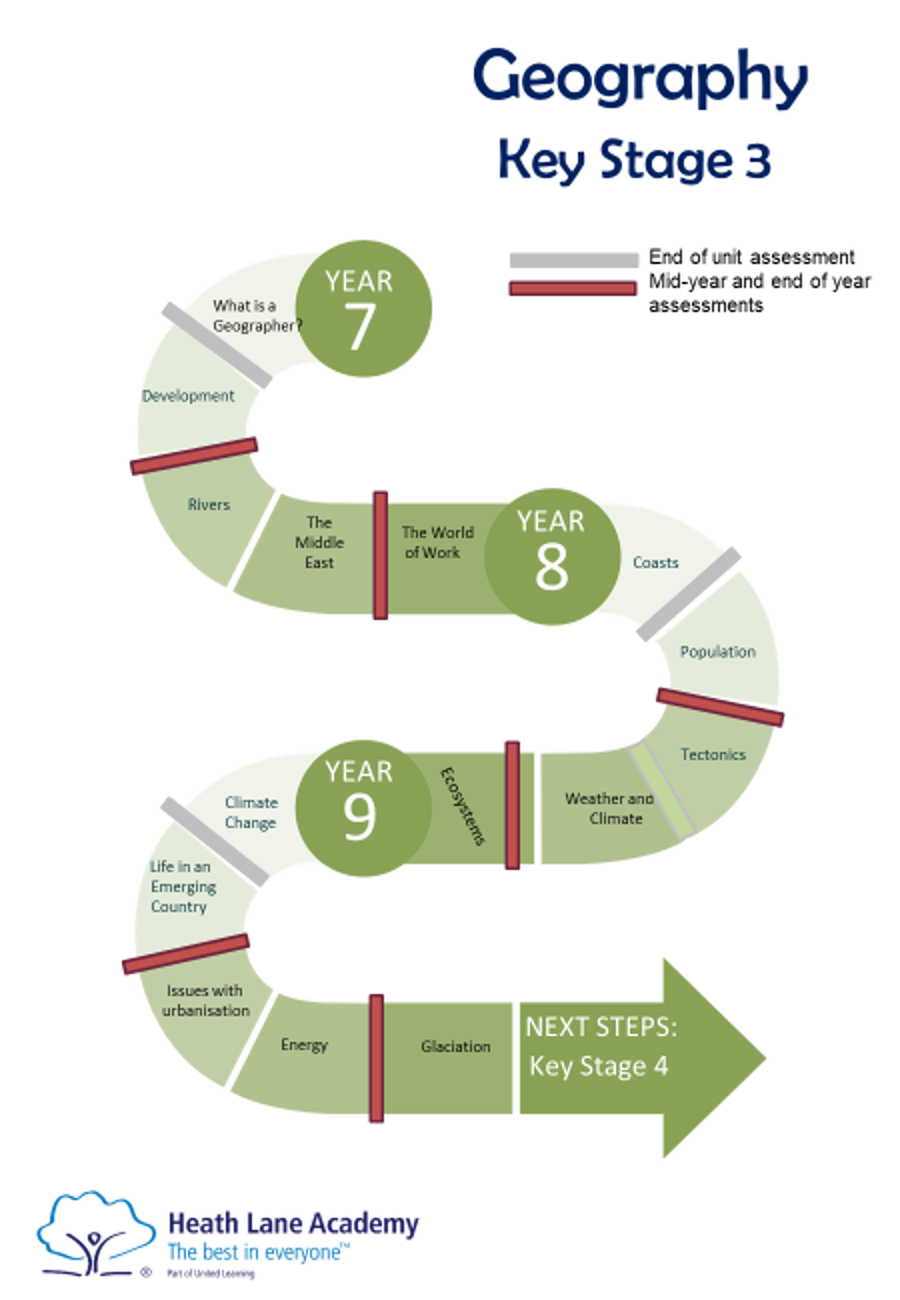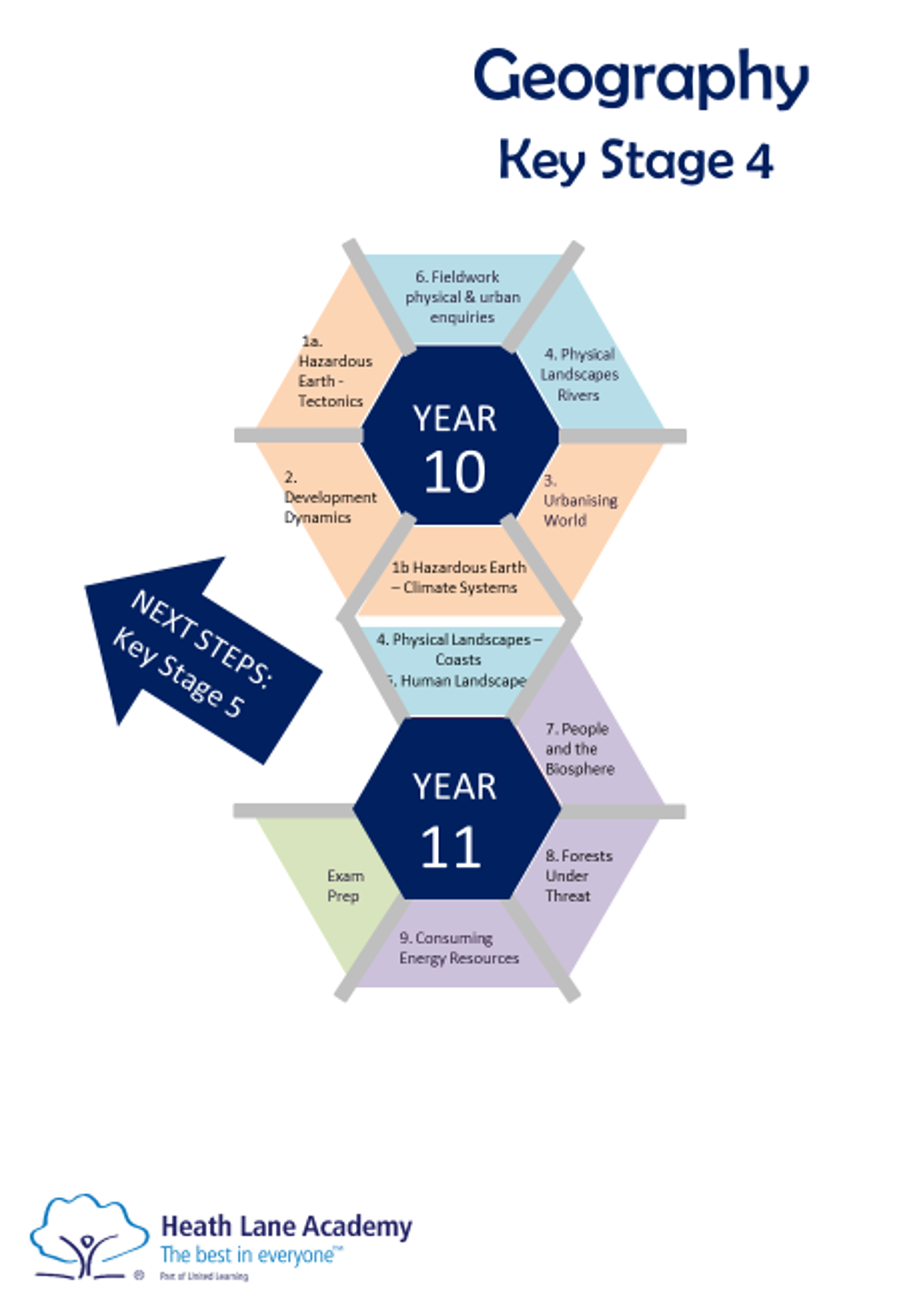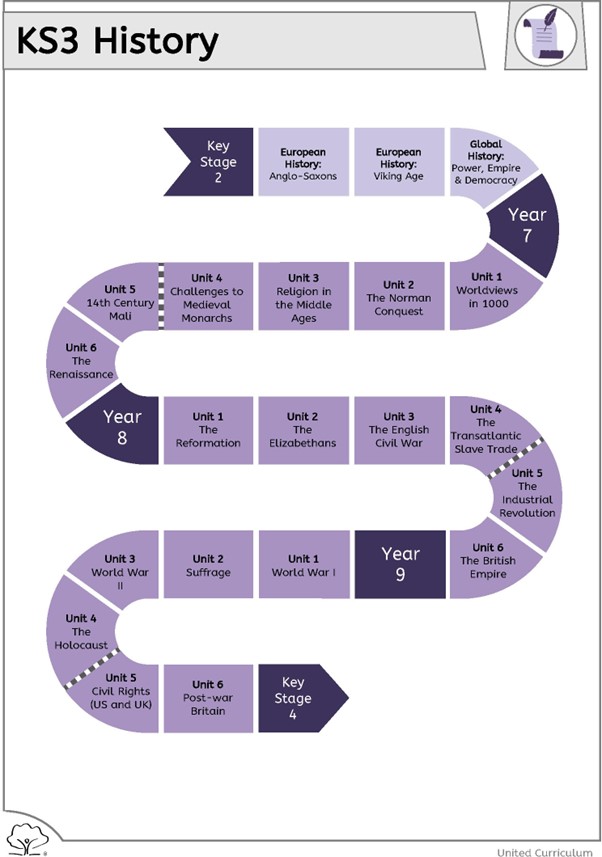Geography
Please note that our subject pages are currently being updated as we move across to the United Learning Curriculum. If you have any queries regarding our curriculum, please contact us.
The Geography curriculum starts in Year 7 with a unit of work introducing students to the skills required in Being a Geographer. Moving from this, pupils then start to learn about Development and the reasons behind inequality around the world. Students then take a look at how water around the world is important in our Rivers unit of work before looking in detail at current affairs in The Middle East. Finally, students study the World of Work and how people around the world have different occupations and why goods travel around the world.
In Year 8 they develop physical geography skills further by studying units on Coasts, Tectonics, Weather and Global Ecosystems. They also investigate how Population changes around the world are impacting upon our way of life.
Moving into Year 9 students continue to build on their physical Geography knowledge studying the important topic on Climate Change and Glaciation and how they impact the UK and the rest of the world. Human Geography topics cover the importance and impact of Energy use, Urbanisation and the development of Emerging Countries.
Pupils are taught using a variety of methods including looking at case studies and located examples to widen their understanding of world Geography. They are also equipped with decision making skills to enable them to begin to make more informed, independent choices. Students also have the opportunity to undertake their own fieldwork investigation, visiting a river and an urban area to apply the theory in the real world. By the time they sit the Edexcel B GCSE Geography qualification in Key Stage 4, pupils will have visited each key concept a number of times to embed the key themes throughout the subject.


History
Please note that our subject pages are currently being updated as we move across to the United Learning Curriculum. If you have any queries regarding our curriculum, please contact us.
The History curriculum at Heath Lane Academy seeks to help pupils develop a coherent knowledge and understanding of Britain’s past and that of the wider world. We want to inspire pupils’ curiosity about the past and what we can all learn from it. Studying history helps pupils understand the complexity of people’s lives, the processes of societal change, the diversity of and the relationships between different peoples, as well as their own identity and the challenges of their time.
Our History curriculum is designed to teach pupils a chronological, knowledge rich overview of local, national, and international History. Lessons examine the key themes that shape society, including religion, war and violence, power, economics, the development of communication and technology, and the roles of key individuals. History lessons are built around ‘big questions’ that teach pupils how to ask perceptive questions, think critically, weigh evidence, assess arguments, and develop perspective and judgement.
As pupils work through our History curriculum they develop vital skills, including chronological understanding, identifying change and continuity, identifying and analysing key points of comparison and contrast, and source analysis (provenance, purpose and utility) and interpretation.
History is one of the most popular subjects at Heath Lane Academy, and for those who choose to follow the subject through Key Stage 4, that culminates in the Edexcel GCSE History qualification. This course covers British medicine since 1250, Superpower relations and the Cold War, Henry VIII and his ministers, and Germany 1918-1939.
Throughout their journey as students of History at Heath Lane Academy, our pupils develop essential knowledge and critical thinking, needed to be a well-rounded citizen in modern Britain.

Year 10
| Autumn 1 |
GCSE History – Medicine – 18th & 19th centuries |
| Autumn 2 | GCSE History – Medicine – 20th century and Historic Environment |
|
Spring 1 Spring 2 Summer 1 |
Weimar Germany and Nazi Germany |
|
Summer 2 |
American West |
Year 11
|
Autumn 1 Autumn 2 |
Weimar and Nazi Germany |
|
Spring 1 |
Henry VIII |
| Summer 2 | Henry VIII and Revision/Exams |
Religious Education
Please note that our subject pages are currently being updated as we move across to the United Learning Curriculum. If you have any queries regarding our curriculum, please contact us.
Our Religious Education curriculum is designed to provide students with a comprehensive understanding of various religious beliefs and philosophical concepts while fostering our core values of respect, hard work, and kindness.
From Year 7, students delve into the study of Judaism and Christianity, laying the foundation for understanding religious traditions and their impact on society. In Year 8, the focus shifts to Islam and the Philosophy of Religion, encouraging students to critically analyse different belief systems and ethical principles.In Year 9, students explore themes of Life and Death, as well as Equality, delving into the complexities of these topics and their significance in contemporary society.
Throughout their journey in Religious Education, students are challenged to think critically, engage in meaningful discussions, and approach topics with academic rigor. By studying diverse religious beliefs and philosophical concepts, students learn to respect and appreciate different perspectives, fostering a culture of empathy and understanding.
Our curriculum emphasises the value of hard work, as students are encouraged to actively participate in their learning and strive for academic excellence. Additionally, discussions on ethics and morality promote kindness and compassion towards others, nurturing a supportive and inclusive school community.


